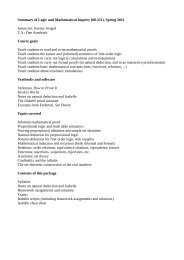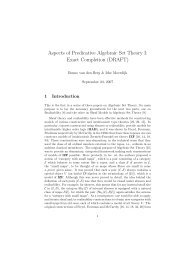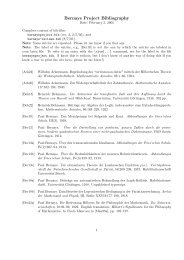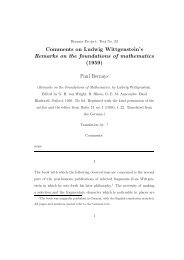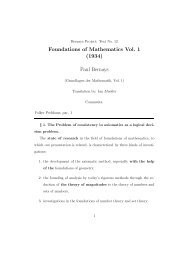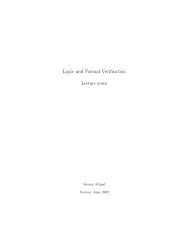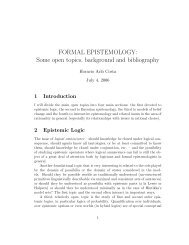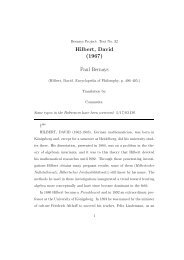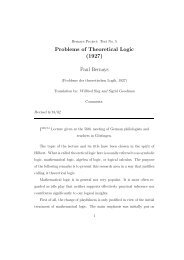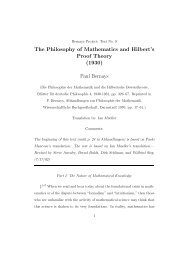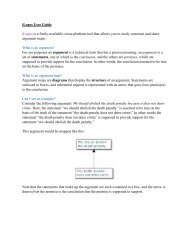Platonism in mathematics (1935) Paul Bernays - Phil Cmu
Platonism in mathematics (1935) Paul Bernays - Phil Cmu
Platonism in mathematics (1935) Paul Bernays - Phil Cmu
You also want an ePaper? Increase the reach of your titles
YUMPU automatically turns print PDFs into web optimized ePapers that Google loves.
of explanation.<br />
A misunderstand<strong>in</strong>g about Kronecker must first be dissipated, which<br />
could arise from his often-cited aphorism that the <strong>in</strong>tegers were created by<br />
God, whereas everyth<strong>in</strong>g else <strong>in</strong> <strong>mathematics</strong> is the work of man. If that were<br />
really Kronecker’s op<strong>in</strong>ion, he ought to admit the concept of the totality of<br />
<strong>in</strong>tegers.<br />
In fact, Kronecker’s method, as well as that of Brouwer, is characterized<br />
by the fact that it avoids the supposition that there exists a series of natural<br />
numbers form<strong>in</strong>g a determ<strong>in</strong>ate ideal object.<br />
Accord<strong>in</strong>g to Kronecker and Brouwer, one can speak of the series of num-<br />
bers only <strong>in</strong> the sense of a process that is never f<strong>in</strong>ished, surpass<strong>in</strong>g each<br />
limit which it reaches.<br />
This po<strong>in</strong>t of departure carries with it the other divergences, <strong>in</strong> particular<br />
those concern<strong>in</strong>g the application and <strong>in</strong>terpretation of logical forms: Neither<br />
a general judgment about <strong>in</strong>tegers nor a judgment of existence can be <strong>in</strong>ter-<br />
preted as express<strong>in</strong>g a property of the series of numbers. A general theorem<br />
about numbers is to be regarded as a sort of prediction that a property will<br />
present itself for each construction of a number; and the affirmation of the<br />
existence of a number with a certa<strong>in</strong> property is <strong>in</strong>terpreted as an <strong>in</strong>complete<br />
communication of a more precise proposition <strong>in</strong>dicat<strong>in</strong>g a [particular] number<br />
hav<strong>in</strong>g the property <strong>in</strong> question or a method for obta<strong>in</strong><strong>in</strong>g such a number;<br />
Hilbert calls it a “partial judgment.”<br />
For the same reasons the negation of a general or existential proposition<br />
about <strong>in</strong>tegers does not have precise sense. One must strengthen the nega-<br />
tion to arrive at a mathematical proposition. For example, it is to give a<br />
8



